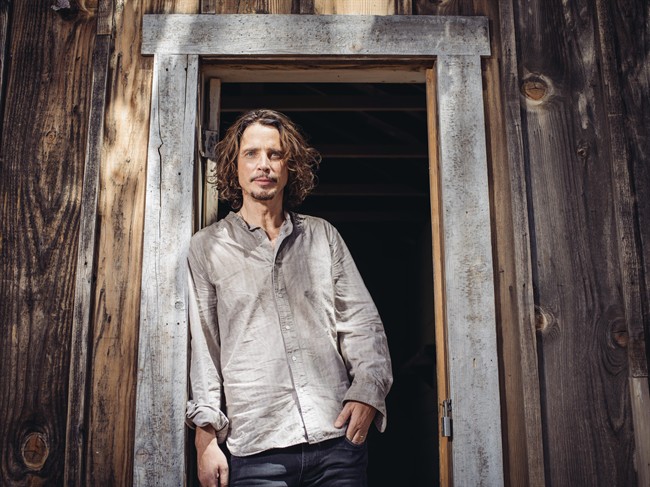The apparent suicide of grunge music icon Chris Cornell hours after a boisterous performance sent shockwaves as fans and those closest to Cornell reeled from the sudden news.

Cornell, 52, was touring with Soundgarden at the time of his death and had recently released new solo music. He was found dead in a Detroit hotel room shortly after midnight Thursday; The Wayne County Medical Examiner’s Office said Cornell, a father of three, hanged himself.
READ MORE: Chris Cornell dead: Soundgarden frontman and grunge icon dies at 52
In a statement, his wife Vicky disputed that her husband intentionally killed himself. She said her husband was slurring the last time they spoke in the hours before his death, and that she believes his anxiety medication may have contributed to his death.
“I know that he loved our children and he would not hurt them by intentionally taking his own life,” Vicky Cornell said in the statement.
A full autopsy is yet to be completed. Vicky Cornell said she is hopeful that further medical reports will reveal additional information.
Suicide signs like a ‘puzzle’
People often feel blindsided when someone close to them dies by suicide, said Julie Kathleen Campbell, executive director, Canadian Association for Suicide Prevention. But sometimes, after someone’s passing, some clarity on their death, as heart-wrenching as it may be, will emerge.
READ MORE: Chris Cornell cause of death is suicide, says medical examiner
“When you only have one tiny piece of the puzzle, you might not see what the picture is.”
Even experts often can’t spot the signs that someone is at risk, said Dr. Stanley Kutcher, professor of psychiatry at Dalhousie University.
“It’s very difficult to predict which person will or will not take their life, even for an exceedingly highly trained health-care provider,” Kutcher said. “Even for them, it can sometimes come as a complete surprise, and that’s a challenge, a real challenge.”
WATCH: Chris Cornell dead: Soundgarden frontman and grunge icon dies at 52

Cornell had grappled with addiction in the past, and was taking Ativan at the time of his death to cope with anxiety. In his last conversation with his wife, Cornell said he had taken extra pills that evening. Some possible side effects to taking Ativan — a brand name for lorazepam — include unusual mood or behaviour, confusion, and thoughts of hurting yourself.
Noticing a change in her husband’s behaviour, Vicky Cornell asked a friend to check on her husband, who according to police found Cornell’s body.
Kutcher said people with mental disorders or history of substance abuse do tend to be at higher risk of suicide.
“But again — and this is one of the most difficult things — at that one point in a person’s life, what are the factors that come together for that one person,” said Kutcher.
“We can speculate all we want but we don’t really ever know.”
People can often suffer in silence for years.
“While suicide is most often related to a disorder such as depression, circumstances and intensity of suicidal ideation can change very rapidly,” said Kutcher. “An individual who has been feeling suicidal on and off can go on like that for years.”
WATCH BELOW: Seattle’s Space Needle mourns loss of Chris Cornell by going dark

Suicide is a relatively rare event, however, data shows that rates are higher among men than women, especially in the middle-age years.
Last year, the Centers for Disease Control and Prevention (CDC) released a report showing that suicide rates in the U.S. increased by 24 per cent between 1999 and 2014. In the same time period, suicide rates among men aged 45 to 64 jumped by 43 per cent.
For Canadian males, the highest suicide rate is observed between the years of 45 to 59. Among Canadian adults (20 to 64 years) men account for more than 70 per cent of all suicides.
While there is no one reason for the difference between the genders, one big one is that men are often more hesitant to seek help than women, said Campbell.
“We know that especially for men, it is even harder to reach out for help,” said Campbell. “They’ve learned that to be a man, you’re supposed to solve your problems yourself, so we do have a lot of work to do around that too.”
READ MORE: Remembering Chris Cornell
- Buzz kill? Gen Z less interested in coffee than older Canadians, survey shows
- ‘She gets to be 10’: Ontario child’s heart donated to girl the same age
- Bird flu risk to humans an ‘enormous concern,’ WHO says. Here’s what to know
- Canada updating sperm donor screening criteria for men who have sex with men
Approaching the subject of suicide with someone can begin with simply letting them know that you’re there to talk.
“It tells the person, ‘I am open to hearing your pain,'” said Campbell.
And you don’t need to have the answers, said Campbell, only a willingness to support them in finding the help they need.
If you or someone you know is in crisis and needs help, resources are available. In case of an emergency, please call 911 for immediate help.
The Canadian Association for Suicide Prevention, Depression Hurts and Kids Help Phone 1-800-668-6868 all offer ways of getting help if you, or someone you know, may be suffering from mental health issues.




Comments